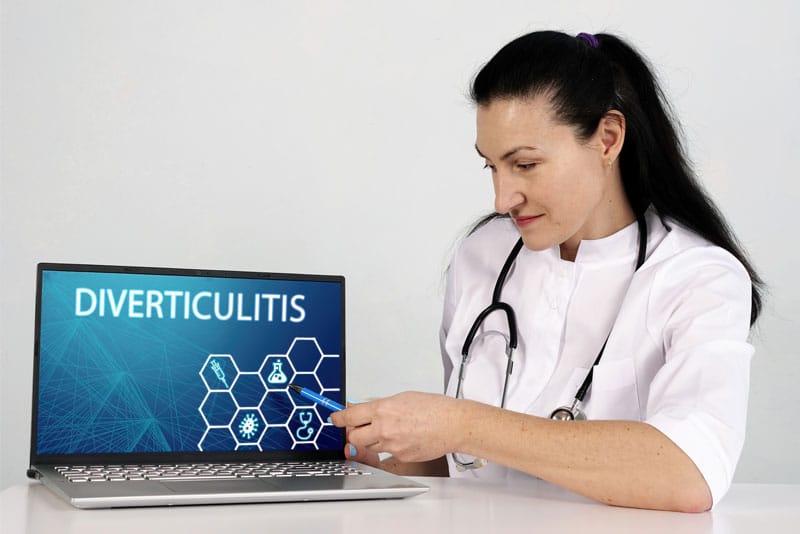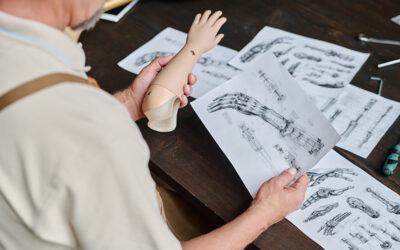A common gastrointestinal condition, diverticulosis refers to small pouches or pockets (diverticula) that occur within the wall or lining of any specific portion of the digestive tract. The pouches occur when the inner layer of the digestive tract pushes through weak spots in the outer layer. In certain cases, patients will have several small pouches on the left side of the colon, while others may have involvement in most of the colon. The condition is quite common and doesn’t usually cause any specific symptoms or require treatment. However, diverticulosis can lead to diverticulitis – which refers to inflammation (swelling) and infection in one or more diverticula. People may feel pain, nausea, fever and have other symptoms. This is a much more serious and potentially dangerous condition. Mild cases can be treated with antibiotics and surgery may be required if any specific problems develop. Incorporating a high-fiber diet, exercise and consuming lots of water can help prevent the condition in the long run. Documentation elements for this gastro-intestinal condition depends on the location (whether it is small intestine, large intestine, or small and large intestine), as well as any manifestations or complications. For correct clinical documentation of the condition using the right ICD-10 codes, physicians can rely on the services of reputable medical billing companies.
Diverticulosis affects half of all people over 60 years of age and nearly everyone by the age of 80 years in the United States. On the other hand, diverticulosis is unusual in people under 40 years of age. The exact causes of the condition are not clear, however, in most cases the condition is caused due to lack of fiber in the diet. Not consuming enough fiber diet causes buildup of waste (constipation) within the colon – which puts extra strain on the walls of the colon – causing the little pockets inside the diverticula – that form within the weak areas of the colon.
Symptoms And Risk Factors
People with this condition experience certain symptoms like – swelling or bloating, abdominal cramps or pain, constipation (due to difficulty in stool passage through the affected region of the colon), tenderness over the affected area, changes in bowel movement patterns, bloating or gas and fever and general malaise. However, it is important to note that experiencing one or more symptoms doesn’t fully mean that a person has diverticulosis. In fact, these symptoms may relate to other gastrointestinal disorders such as irritable bowel syndrome, celiac disease, inflammatory bowel disease, appendicitis, gallstones and stomach ulcers. If left untreated, diverticulosis may lead to several complications including inflammation, infection, bleeding or intestinal blockage.
How Is Diverticulosis Treated?
As most people with diverticulosis don’t experience any specific symptoms, it is generally diagnosed incidentally from other tests that are performed for other conditions or during screening exams performed for detecting polyps. Physicians may perform a medical history review, symptom evaluation, bowel movements and check the abdomen for pain and tenderness. Most people with diverticulosis without any specific symptoms may not require any specific treatment. Since diverticulosis could lead to diverticulitis, patients need to consume high-fiber diet (increase the intake of fruits, vegetables or grains) as a preventive measure. Intake of fiber products can make the bowel movements easier. Physicians may prescribe medications to help relax spasms in the colon that cause abdominal cramping or discomfort. If diverticulosis leads to severe diverticulitis, surgery (involving removing part of the colon and reattaching it to the rectum) may be recommended as an option.
ICD-10 Codes For Diverticulosis
In ICD-10-CM, diverticular disease of intestine or diverticulitis is coded to K57. The codes include location (small, large or small and large intestine), with or without perforation or abscess, and with or without bleeding –
- K57 Diverticular disease of intestine
- K57.0 Diverticulitis of small intestine with perforation and abscess
- K57.00 …… without bleeding
- K57.01 …… with bleeding
- K57.1 Diverticular disease of small intestine without perforation or abscess
- K57.10 Diverticulosis of small intestine without perforation or abscess without bleeding
- K57.11 Diverticulosis of small intestine without perforation or abscess with bleeding
- K57.12 Diverticulitis of small intestine without perforation or abscess without bleeding
- K57.13 Diverticulitis of small intestine without perforation or abscess with bleeding
- K57.2 Diverticulitis of large intestine with perforation and abscess
- K57.20 …… without bleeding
- K57.21 …… with bleeding
- K57.3 Diverticular disease of large intestine without perforation or abscess
- K57.30 Diverticulosis of large intestine without perforation or abscess without bleeding
- K57.31 Diverticulosis of large intestine without perforation or abscess with bleeding
- K57.32 Diverticulitis of large intestine without perforation or abscess without bleeding
- K57.33 Diverticulitis of large intestine without perforation or abscess with bleeding
- K57.4 Diverticulitis of both small and large intestine with perforation and abscess
- K57.40 …… without bleeding
- K57.41 …… with bleeding
- K57.5 Diverticular disease of both small and large intestine without perforation or abscess
- K57.50 Diverticulosis of both small and large intestine without perforation or abscess without bleeding
- K57.51 Diverticulosis of both small and large intestine without perforation or abscess with bleeding
- K57.52 Diverticulitis of both small and large intestine without perforation or abscess without bleeding
- K57.53 Diverticulitis of both small and large intestine without perforation or abscess with bleeding
- K57.8 Diverticulitis of intestine, part unspecified, with perforation and abscess
- K57.80 …… without bleeding
- K57.81 …… with bleeding
- K57.9 Diverticular disease of intestine, part unspecified, without perforation or abscess
- K57.90 Diverticulosis of intestine, part unspecified, without perforation or abscess without bleeding
- K57.91 Diverticulosis of intestine, part unspecified, without perforation or abscess with bleeding
- K57.92 Diverticulitis of intestine, part unspecified, without perforation or abscess without bleeding
- K57.93 Diverticulitis of intestine, part unspecified, without perforation or abscess with bleeding
Regular bowel movements and avoiding constipation and straining are important to prevent the complications associated diverticular disease. Eating a high fiber eat, drinking plenty of water and performing regular body exercise can help prevent the condition in the long run.
Gastroenterology medical billing and coding can be challenging. With proper clinical documentation, billers and coders in reputable physician billing companies can help physicians report diverticulosis using the right ICD-10 medical codes – which is essential to maximize reimbursement and avoid denials.




